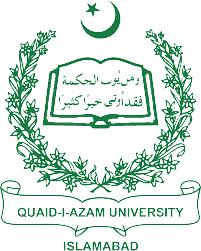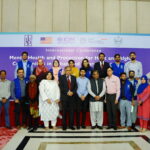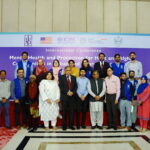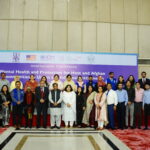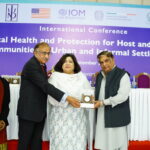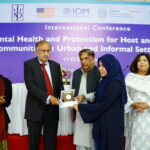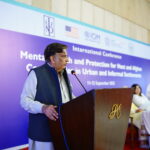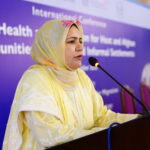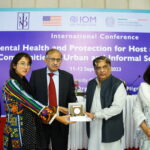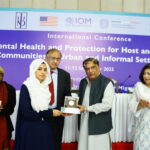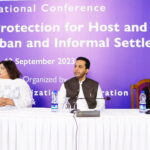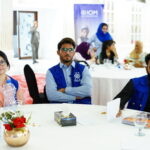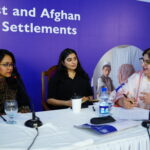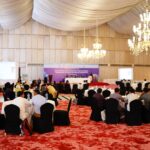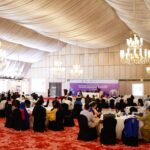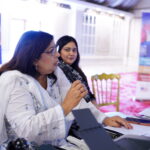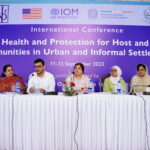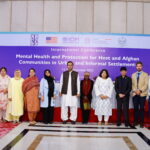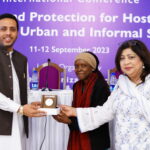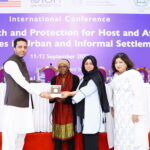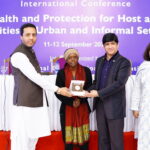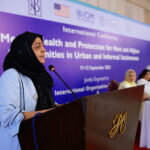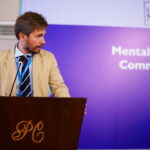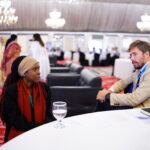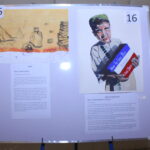NIP-IOM International Conference Karachi
International Conference
Mental Health and Protection of Host and Afghan Communities in Urban and Informal Settlements
11-12 Sept. 2023, Pearl Continental Hotel, Karachi
International Conference “Mental Health and Protection of Host and Afghan Communities in Urban and Informal Settlements” on 11-12 Sept. 2023 was 3rd joint event organized in collaboration with UN International Organization for Migration. First International Conference was organised on 13-15th March in Islamabad focusing on mental health of displaced Afghans where solutions for all stakeholders were discussed in addressing mental health challenges that Afghan people are facing because of displacement, war, and trauma. Second conference was organised on 18-19 July in Serena Hotel, Peshawar where major focus was protection and care around borders and problems faced by natives in process of hosting. This Conference was aimed at discussing the strategies to design, implement, and evaluate mental health and psychosocial support projects and activities for emergency-affected and displaced populations living in Urban and informal areas.
The first day was preconference workshop organized by Dr. Nelofar Rauf (Assistant Prof. NIP) in which focus was creating awareness among health professionals regarding gender-based violence and assessment and prevention of substance use. The second was the Conference Day including keynotes, guest speeches, oral presentations of empirical studies, panel discussion, and poster presentations. Experts from developmental, governmental, academic sectors; international and national NGOs; and UN agencies attended the conference. The conference started at 9:00 am with Inaugural Ceremony. Dr. Humaira Jami (Organizer, Assistant Professor, NIP) delivered opening remarks; Prof. Dr. Rubina Hanif (Chief Organizer, Director, NIP) welcomed conference participants and guests; Dr. Marsela Nyawara (Emergency Health Officer, IOM) shared thoughts about conference objectives; Mr Alexey Dudarev as Guest Speaker (Head of Field Office Karachi, UNHCR) talked about significance of interdisciplinary approach in handling challenges faced by host and migrants. Finally, Mr. Hamood-u-Rehman (Chief Guest, Commissioner, Commissionerate of Afghan Refugees Sindh) shared thoughts on the issue under consideration and what measures Sindh government is taking up to address health related issues of host and Afghan communities.
The rest of the day included keynotes, guest speeches, oral presentations of empirical studies, panel discussion (coordinated by Dr. Aisha Zubair), and poster presentations (coordinated by Dr. Arooj Mujeeb). Day was concluded with an overview of the conference by Dr. Humaira Jami and Note of Thanks by Prof. Dr. Rubina Hanif and Dr. Marsela Nyawara. Dr. S. M. Tariq Rafi (Chairman HEC Sindh) and Senator Karim Khuwaja (Chairman, Sindh Mental Health Authority) after their reflections on the conference distributed shields and certificate as token of appreciation to the Conference guests and presenters. During the Conference, Dr. Imran Bukhari managed registration, while Mr. Ubaidullah and Mr. Fahad Mukhtar provided IT support, while Mr. Tahir Ellahi coordinated administrative and logistic support.
Focus in the Conference was more regional in nature that is Sindh, a key area for providing employment facilities to diverse population in urban settings. All activities of the Conference were focused to emphasize the impact of trauma and displacement on mental health of Afghan and host communities and how safety, control, and protection can be restored to add predictability in life. The conference was well attended by 164 participants from 5 International, 35 NGOs, 17 governmental, 5 health-based, and 14 academic sector organizations.
Following recommendations were shortlisted in the Conference, which were furnished by experts while sharing their experiences in discussing protection and care of displaced Afghans.
1. In educational settings Afghan people face different challenges in urban settings including complicated and unfamiliar documentation process, restricted access, unambiguous equivalency procedures, difficult administrative procedures, difficulty in language acquisition, and financial constraints. These experiences vary across gender and language spoken at home. Peer supported initiatives and digital literacy programs may help to combat these challenges. Awareness campaigns, streamlining equivalency procedures, and simplifying administrative procedures can help address issues faced in education sector.
2. Social cohesion programs and teamwork initiatives can be effective for social integration of Afghan people in urban settings. Successful integration hinges to language acquisition, social network development, positive local interactions, and access to essential services and policies tailored to Afghan people’s needs. Social effects cognitive capital, shared values, beliefs, and norms integrate or segregate people. Hence, similarity needs to be enhanced to promote tolerance among society.
3. Current research in Pakistan is more focused on data from men, Peshawar and Balochistan areas, highlighting mental health challenges related to unemployment, societal attitudes, and adaptation on prevalence of gender-based violence. Research further highlights that children, youth, and women are the most vulnerable segment among Afghan people. Research is needed to understand issues in urban and informal settings in Pakistan which is very scarce. Available data is quite less or outdated; hence, immediate attention is needed to plan interventions carefully.
4. Evidence-based ideas for prevention of mental health are needed to develop culturally sensitive and sustainable programs to empower communities and foster resilience ensuring equitable access to mental health services.
5. A coordinated multiservice approach is needed to support mental health and integration of refugees.
6. Maternal health and infant development are connected. Brief psychological intervention and learning through play is a feasible strategy to address self-harm-based vulnerabilities among mothers.
7. The geo-political situation needs stability to ensure the safety and security needs of inhabitants. A safety net needs to be built to avoid trauma and abuse.
8. Training modules for training of health and mental health workers are required to be designed and implemented quickly to train them in how to meet needs of host and Afghans. They need to be aware of in how to reinstate protection and safety within their boundaries.
9. To bring element of certainty, predictability, and control in life of host and Afghans education, vocational trainings including women also actively engaged are of utmost importance. This will help them to integrate in the host society and to become productive members of the society

